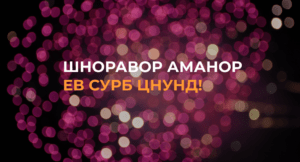In this article, we will talk about how teachers and researchers after moving to continue their careers in Armenian educational institutions, share the algorithms for collecting the necessary documents. Before reading this text, we recommend that you familiarize yourself with the materials about the peculiarities of the labor legislation of Armenia, as well as about how to find a job and conclude a legal employment contract.
Document packages
Let's start from the zero point and the starting point of departure for any bureaucratic journey - the collection of documents.
Once you have made the decision to move, you need to start preparing several packages of documents. Some of them need to be formalized in Russia in advance, and some can be put in order already in Armenia.
Step 1: Collect the original documents:
- internal passport;
- international passport;
- diploma of education;
- birth certificate;
- certificate of good conduct.
It is also worth, just in case, to find the original certificates of advanced training, diplomas, award letters and other papers that somehow confirm your professional level.
Step 2: Apostille documents
Apostille — is the official legalization of documents for their recognition abroad. An apostille can be obtained from the authorized bodies of the Russian Federation at the place of issue of documents, they can be the MFC, Rosobrnadzor, etc. From the above list, we recommend apostille for everything except passports. Despite the fact that an agreement was signed between Russia and Armenia to abolish the legalization of documents, it will not hurt to have an apostille.
Step 3: Translate documents into Armenian
Before you can submit your documents to Armenian educational institutions, they must be translated into Armenian. This can be done both in Russia and in Armenia. Translations of documents, as a rule, must be certified by notary. Translation of documents in Armenia will cost you approximately 4,000 drams, in Russia — 800-900 rubles.
Step 4: Get a social card
Social card — is a document through which the right of citizens in the Republic of Armenia to social security is realized. An analogue of a social card in Russia is — SNILS or public services number. For example, a social card — is one of the necessary documents for obtaining Residence permit due to employment in Armenia.
A detailed algorithm for issuing a social card is described in the Move2Armenia FAQ
You can get a document at any passport office or OVIR, you must have with you:
- original international passport (you can also get a social card using a Russian passport, but you need to be prepared for the fact that the list of required documents will triple);
- scanned copy of the page with the entry stamp;
- notarized translation of a foreign passport into Armenian, scanned copy of the translation;
- application for a social number.
Step 5: Finding a Job
We have reached a point that cannot be decomposed into simple understandable algorithms. In the process of finding a suitable job, there will always be room for luck and chance. Any means will be good - from letters to the official addresses of educational institutions to personal calls and visits to the place of desired employment. We offer to start with See our detailed guide on how to find a job in Armenia. You can also study section "Career" on our website.
Step 6: Execute an employment contract in an Armenian institution
In order to start working in Armenian educational or scientific institutions, it is necessary to conclude an employment contract with this institution or an agreement for the provision of educational services (depending on the nature of the work provided). To do this, you need to contact the Human Resources Department or the Human Resources Department at the institution where you would like to work.
You may need the following documents:
- passport and international passport;
- apostilled copies of education diploma and birth certificate;
- medical certificate of health (can be obtained at any clinic).
For some positions, a health book may be required. Before the doctor fills it out, the book will have to be bought. You can do this at any newsstand.
Step 7: Register your work
After you have concluded an employment contract, do not forget to register your work with the tax office. To do this, you need to provide the following documents:
- a copy of the employment contract;
- passport and international passport;
- photo.
Russians register online at workpermit.am.
Step 8: Legalize your stay in Armenia
In order to live and work in Armenia, you need to legalize - get a residence permit or register at the place of residence. We have written a step-by-step algorithm for both procedures in our FAQ: obtaining a residence permit in 2023 and registration (or in other words, registration).
A residence permit is simply issued on the website workpermit.am, there you can get it on family members.
Personal experience
No instruction will inspire as much as the personal experience of a person who has gone through a difficult path to employment in the field of education. We talked with those who have already come into contact with the structure of educational institutions in Armenia and have succeeded in finding a job.
Julia Kuzishchina works as a teacher of English language and literature in European school in Armenia (European school).
About formalities
The above is a rather extensive list of documents - two-thirds of them I did not need when applying for a job. No one asked for an apostille of a diploma, nor its translation, nor a birth certificate. In my case, only copies of diplomas without translation and a notarized copy of the passport were needed.
About experience
I graduated from MPGU (Moscow State Pedagogical University) with a degree in foreign languages and a master's degree from the National Research University Higher School of Economics (National Research University Higher School of Economics) in visual culture. In parallel with my studies at the first university, I worked in two foreign language schools, and after my master’s degree I worked as a teacher for two years at the Kovcheg private school near Moscow. I almost always had a part-time job teaching students, although I haven’t taught for the last few years. I also had a year of volunteering experience with the Moscow organization “Same Children”, where children of migrants and refugees were helped to adapt and learn Russian and school subjects. In general, my relevant experience is quite diverse.
About search
After moving to Yerevan, I was looking for a job related to foreign languages: I went through HH, Staff.am, put filters on LinkedIn. I searched for vacancies for several weeks, in general I sent about thirty different requests.
I found the school where I currently work like this: I opened Google, made a list of private schools, looked somewhere near my home, and it turned out that vacancies were published on Staff.am. I wrote a letter, they answered me literally within a couple of days and called me for an interview.
About the interview
The interview took place in several stages. We started with a standard English language test, with six or seven other applicants writing the test with me. Then I was invited to talk twice: first, to get to know each other and understand whether our goals and interests coincide, then to conduct trial lessons. The second time is to agree in detail on the plans and schedule. I think that my professional language skills were important to my colleagues (later it turned out that the absence of an accent in speech was a big plus), the understanding that I would fit into the multicultural environment established at school and be able to integrate on an equal footing into intensive team work. Another important factor was that I was ready to sign a contract for a year (children can hardly endure the change of teachers). We discussed in detail the subjects and administrative matters that could be of interest to me - as a result, I teach literature in English. I feel that it was a plus for my colleagues that I managed to work in the environment of cultural projects: of course, events look completely different in the educational space, but now past experience helps me in preparing school-wide events.
About documents
We needed a passport, a social card (made at registration at the place of residence), a copy of the diploma, a sanitary book (issued at the nearest clinic). Then they signed a contract with me, and a scanned copy of it had to be registered for a workpermit. After that, you will receive the original document, on the basis of which you can issue a residence permit.
About integration
There was a feeling that there is an opportunity to work in some subjects without a pedagogical qualification, especially if there was experience. Colleagues also regularly ask me if I would like to take Russian lessons at a neighboring school.
I spend most of my time at school in the teachers' room, which I share with foreign language and social science teachers. Some of my colleagues lived or studied in Russia, some came from Syria or Lebanon, it is easy for them to understand what it means to change countries, and what difficulties there are with integration. We have very different experiences and different ideas about a lot of things, including mutual support. I understand that the distance and emotions between people here are not quite the same as in other environments familiar to me. And it's very interesting.
HSE School of Design team
Most recently, the HSE School of Design opened a new direction HSE ART AND DESIGN SCHOOL INTERNATIONAL. This is a joint bachelor’s program of the School of Design with the Russian-Armenian (Slavic) University (RAU), which has been existing in Yerevan for a long time and is successful in its sector.
About the teaching staff
We anticipate that the teaching staff will be mixed — in every sense of the word. For example, the head of the — program Igor Gurovich, 10 years ago he was in the team of Arseny Meshcheryakov at the origins of the founding of the HSE School of Design in Moscow, but has been living in Yerevan for more than a year. In general, the School of Design has a clearly verified and structured educational approach, clearly formulated programs and extensive experience in training new teachers. We understand how to quickly and effectively prepare people to teach in our programs. Therefore, we do not have any quotas: for example, we do not have two Russian teachers for three Armenian ones, but there is a feeling that a balance will naturally be maintained. Well, a lot will depend on how many people we recruit and, accordingly, how many teachers we need.
About working at HSE and RAU
Since the program will be implemented in a network format, some of the teachers are already existing employees of HSE and RAU. And if we talk about new teachers, then the Academic Council of the program will soon be created, which will include representatives from both universities. One of the tasks of the council will be the selection of new team members. But already now, in order to express a desire to join us - either in Moscow or in Yerevan - you can write us a letter with a story about yourself and a link to your portfolio. You can write to the HSE School of Design design@hse.ru or directly to the Head of Communication Design Mitya Harshak dkharshak@hse.ru. The number of teaching vacancies that we will open in Yerevan will naturally directly depend on the number of students who come to study with us.
About bureaucracy
We were very lucky with our colleagues from RAU - at the moment we have not encountered any insurmountable problems in terms of organizing the educational process. Working meetings are underway to combine curricula, on the technology of session viewings, but so far we do not see any insoluble difficulties.















Add a comment